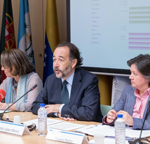Madrid/New York, June 26, 2015 – Half of the 220 million “vulnerable” men and women in the region—those who live slightly above the poverty line but were unable to rise to the middle-class—are working, but under precarious conditions, according to initial UN Development Programme for (UNDP) findings, anticipating its Regional Human Development Report 2015-2016 “Multidimensional progress: well-being beyond income”, which will be launched next year.
The economic boom and poverty reduction that took place in the past few decades significantly affected the labor composition in the region, according to UNDP. The employed population grew nearly 40 per cent, from 205 million people in 1992 to 284 million in 2012. This growth was mostly concentrated in the middle class (those living on $10- 50 per day) and vulnerable populations (those earning between US$4-10 a day). Over 80 per cent of workers are in the service sector, especially in small companies or self-employed as unskilled workers. Many work in apprenticeship, without earning a salary, a practice common among the region’s unskilled youth, according to UNDP.
“More economic growth that only generates precarious employment will not be enough to prevent this vulnerable group—which represents one in every three Latin Americans—from falling into poverty,” said UN Assistant Secretary General and UNDP Director for Latin America and the Caribbean Jessica Faieta during the second Regional Human Development Report Advisory Board meeting taking place at the Ibero-American Secretariat headquarter in Madrid today.
“Boosting their resilience requires strengthening capabilities, increasing their assets and access to social safety nets: to avoid setbacks and boost social gains we must invest in people,” Faieta added.
Lack of protection – In spite of the expansion of jobs in the region and an overall salary increase in the last two decades there were no significant improvements in social security for workers. UNDP even noted a slight deterioration in the case of access to pensions, especially among the poor, with huge inequality in access to pension and health care among the poor compared to vulnerable and middle class workers. According to UNDP such disparity reflects a tradition of linking job quality and rights to social security to the formal labour market, which is out of reach for most workers in the region.
Despite the region’s slowdown in economic growth, UNDP calls for greater political will to continue boosting social investments, including quality education and health services, that ensure a minimum level of protection against shocks such as unemployment, sickness, economic recession, insecurity or natural disasters—which can all push this group back into poverty.
“The need to expand social protection systems is in line with the new vision towards the Sustainable Development Goals and the new Post 2015 Agenda. This is reflected in the idea of multidimensional progress and well-being beyond income alone, which entail access to decent work, health and education throughout people’s life cycle, “said Gonzalo Robles, the Government of Spain’s Secretary General for International Development Cooperation, a strategic and financial partner for UNDP’s Regional Human Development Report.
New report website –UNDP announced today in Madrid the report’s new interactive website, prepared by Telefonica. The website is currently available in Spanish [masqueingreso.org] and will soon be made available in English as well [morethanincome.org]
The latest report findings are already online (in Spanish) and and an upcoming survey on subjective well-being in the region will soon be made available, to help assess people’s quality of life beyond their income or living below or above the poverty line.
“We must invest in skills for youth employment and we must continue working to reduce the gaps that still exist in Latin American societies, which Telefónica has been significantly contributing to in the communities in which we operate, thanks to the company’s commitment to youth and technological innovation, “said Carlos Lopez Blanco, Telefonica’s Director General of Public Affairs and Regulation.
UNDP’s partnership with Telefónica is part of an agreement within the framework of the new global Post 2015 Development Agenda and in the areas of innovation and youth.
About the Report: This third Human Development Report for Latin America and the Caribbean is an editorially independent publication commissioned by UNDP. This report is being prepared with financial support from the Spanish Agency for International Cooperation for Development (AECID, in Spanish). Over 20 regional authorities take part in the report’s Advisory Board including ministers, senators, academics and the current leaders of the region’s major multilateral organizations. For more information latinamerica.undp.org
For more information:
UNDP New York: Carolina Azevedo, [email protected]; Tel: +1 212 906 6127
AECID in Madrid: comunicació[email protected]
Telefonica in Madrid: [email protected]; + 34 91 482 38 00







